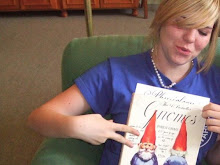The first book I remember that really changed my life was Shel Silverstein's Where the Sidewalk Ends. I believe I was 8 when I read it, but before I could read these treasured poems myself, my Dad read them to me as a child. My father was a 5th grade teacher, and his favorite book to read to his class was The BFG (The Big Friendly Giant) by Roald Dahl, so these poems suited his style. He was a fantastic reader, and looking over poems like Sarah Sylvia Cynthia Stout Would Not Take the Garbage Out, Smart, and Sick (my personal favorite) I'm reminded of my dad's cadence, the way he would make the whisper part of Sick raspy, and how he would cheerily utter, "Goodbye, I'm going out to play." I would giggle with him after dinner, or on a rainy afternoon we'd make a blanket fort, and he'd read to me. Dad loves limmericks and rhyming, and has always written funny, silly poems for special events, retirements, and birthdays.
I would sit there, listening, hearing the delicate phrasing, and an image of the scene would appear. Before I flipped the pages one day, I already knew what Sylvia and Peggy Ann looked like; I could see Peggy Ann acting out, pointing to her ailments, overreacting, and then trotting out the door on a Saturday. I began to imagine what this town looked like, and where the end of the sidewalk would be placed on a map. The town always reminded me of Portland, where my aunt lived back then. The events that occured in Where the Sidewalk Ends could never happen in small-ville Kelso where I was--it was far too boring.
When I finally read the poems from my childhood, they felt even more alive, more vibrant, and now the drawings flowed with the story, and created lively images, metaphors, and allusions in my head. I feel I have a fairly active, if not over-active imagination, and being read to simply fueled this notion. Reading it later helped me see the words, the lengths of phrases and sentences, where the comma went, or why he stopped the sentence where he did. His language was always so alive, full of youth, and contained a phenomenal amount of detail.
It changed the way I viewed poetry, writing, and how I relate to words today.
Friday, February 27, 2009
Subscribe to:
Post Comments (Atom)

1 comment:
Shel Silverstein was a big part of my childhood, too. It didn't even matter that my neighborhood had no sidewalks.
Post a Comment